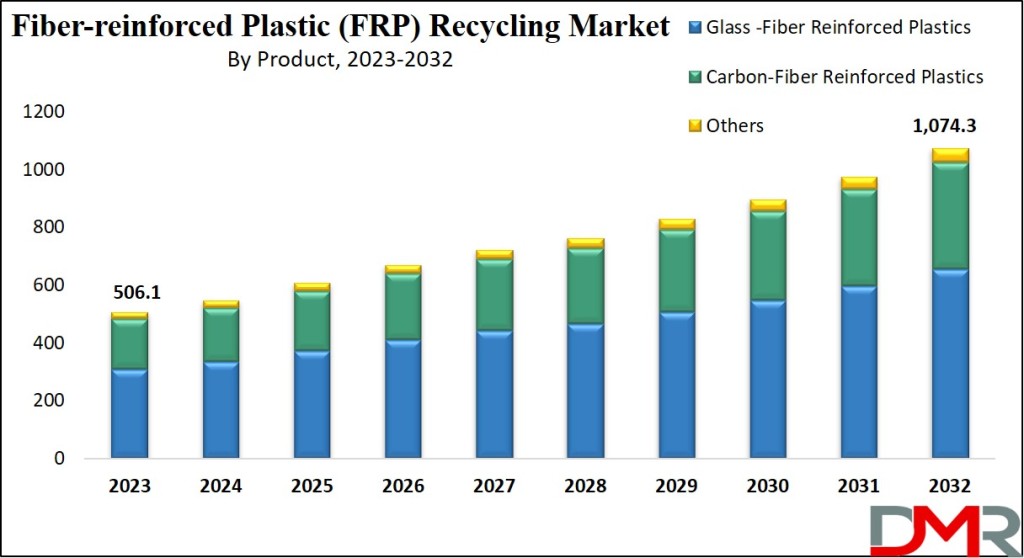Fiber-reinforced Plastic (FRP) Recycling Market: Transforming Waste into Opportunities
In today's era of heightened environmental awareness and sustainable practices, industries across the globe are increasingly turning towards recycling as a solution to manage waste effectively. One such area witnessing significant traction is the Fiber-reinforced Plastic (FRP) Recycling Market. With the global market projected to reach a valuation of USD 506.1 million by 2023 and expected to grow at a CAGR of 8.7% from 2023 to 2032, the landscape of FRP recycling presents a promising avenue for sustainable innovation and economic growth.

Get a Free PDF Sample Copy of This Report@ https://dimensionmarketresearch.com/report/fiber-reinforced-plastic-recycling-market/request-sample
Understanding the Dynamics of FRP Recycling
Market Dynamics
The surge in Fiber-reinforced plastics (FRPs) usage owes much to their exceptional properties, including high strength, lightweight nature, chemical resistance, and superior tensile strength. This increased utilization, however, has led to a proportional rise in waste generation, necessitating effective waste management strategies. The construction sector, among others, heavily relies on recycled fiber-reinforced plastic waste, thereby driving market growth. Despite these advancements, challenges such as maintaining component surface quality post-recycling remain, hindering widespread adoption. Nevertheless, the concerted efforts towards encouraging CFRP (carbon-fiber-reinforced plastic) reuse and strict regulatory measures on composite disposal are expected to fuel market expansion.
Scope and Analysis of FRP Recycling
By Product
- GFRPs (Glass-fiber reinforced plastics): Dominating the market, GFRPs are preferred for their versatility, flexibility, and ease of forming. Their widespread usage in sectors like building & construction and transportation contributes to increased waste generation, necessitating recycling efforts.
- CFRPs (Carbon-fiber reinforced plastics): With features such as high tensile strength and stiffness, CFRPs find applications across various sectors. The increasing instances of their reaching the end of useful life propel the demand for recycling, supported by governmental policies and environmental responsibilities.
By Recycling Technique
- Incineration & Co-incineration: This dominant technique, especially co-incineration, is specific to GFRP recycling. It not only facilitates waste combustion but also converts generated heat into electricity or direct utilization.
- Mechanical Recycling: Involves breaking down larger scrap composites into smaller recyclable items, predominantly used for thermoset fiber-reinforced plastic composite materials.
Market Application Analysis
By End-Use
- Building & Construction: Dominating the market, recycled FRPs find diverse applications in this sector owing to their suitable characteristics such as electrical insulation, thermal stability, and lightweight nature.
Key Takeaways:
- Market Growth: The Fiber-reinforced Plastic (FRP) Recycling Market is projected to reach a valuation of USD 506.1 million by 2023, with a compound annual growth rate (CAGR) of 8.7% from 2023 to 2032.
- Drivers of Growth: Increasing demand from sectors such as industrial, transportation, and building & construction, coupled with stringent regulations on waste management, propel market expansion.
- Challenges: Despite advancements, challenges persist in maintaining component surface quality post-recycling and limited suitable methods for recovering waste materials.
- Dominant Techniques: Incineration & co-incineration, particularly for GFRP recycling, and mechanical recycling methods are dominant techniques in the FRP recycling landscape.
Recent Developments in the FRP Recycling Market (2023-2024):
Growth and Market Size:
- Market size: The FRP recycling market is expected to reach USD 1 billion by 2033, growing at a CAGR of 8.0%.
- 2024 projection: The estimated market size for 2024 is 114.49 tons, expected to reach 178.91 tons by 2029.
- Improved mechanical recycling: Development of new sorting and separation technologies to efficiently handle complex FRP waste compositions (2023).
Buy This Exclusive Report Here@ https://dimensionmarketresearch.com/checkout/fiber-reinforced-plastic-recycling-market
Regional Analysis and Market Outlook
Europe emerges as a frontrunner in FRP recycling, driven by rising demand for recycled products and stringent regulations against landfilling. The region's focus on sustainable energy solutions further boosts the adoption of recycled FRPs, particularly in sectors like wind energy.
FAQs
1. What drives the growth of the Fiber-reinforced Plastic (FRP) Recycling Market?
- The market growth is primarily fueled by the increasing demand from sectors like industrial, transportation, building & construction, driven by the exceptional properties of FRPs and the rising need for sustainable waste management practices.
2. What challenges does the FRP recycling industry face?
- Despite advancements, maintaining component surface quality post-recycling remains a challenge, along with limited suitable methods for recovering waste materials, hindering widespread adoption.
3. Which recycling techniques dominate the FRP recycling market?
- Incineration & co-incineration, particularly for GFRP recycling, along with mechanical recycling methods, are among the dominant techniques in the FRP recycling landscape.
4. What are the key end-use sectors for recycled FRPs?
- Building & construction stands as the dominant end-use sector, leveraging the characteristics of recycled FRPs such as electrical insulation and thermal stability. Other sectors include transportation and industrial applications.
5. Which region leads in the FRP recycling market, and why?
- Europe dominates the market, driven by stringent regulations against landfilling and a growing focus on sustainable energy solutions, particularly in sectors like wind energy.
Conclusion
The Fiber-reinforced Plastic (FRP) Recycling Market presents a compelling narrative of transforming waste into opportunities. With growing environmental concerns and regulatory pressures, the demand for sustainable waste management solutions is poised to soar. By leveraging innovative recycling techniques and fostering collaboration across industries, the FRP recycling sector holds the key to a more sustainable and eco-friendly future. As the market continues to evolve, stakeholders must remain vigilant, embracing technological advancements and regulatory frameworks to drive lasting change in the global recycling landscape.














